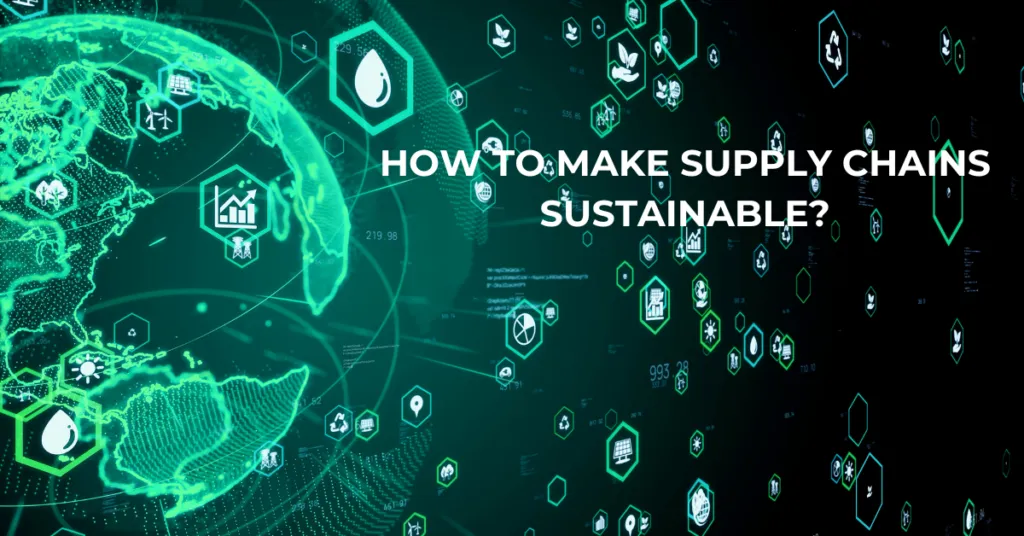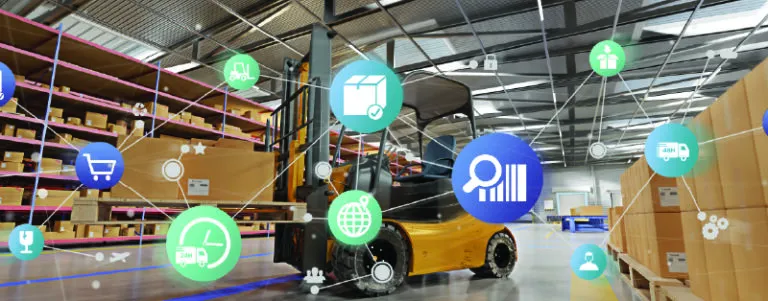8 Best Benefits of Sustainable Supply Chains for Businesses

- What are the Main Benefits of Implementing a Sustainable Supply Chain?
- How Can Companies Measure the Environmental Impact of Their Supply Chain?
- What are Some Best Practices for Integrating Sustainability Into Supply Chain Management?
- How Does Government Regulation Play a Role in Promoting Sustainable Supply Chains?
- What are the Challenges Companies May Face When Transitioning to a Sustainable Supply Chain Model?
According to a report by HSBC, Indian manufacturing businesses need to stay aware of global sustainable supply chain practices to establish their position in the international market and cater to international clients. Moreover, with large MNCs like Samsung and Apple setting up their manufacturing units in India, the demand for sustainable supply processes is likely to increase further. Hence, sustainability has become the leading supply chain trend in India. This article discusses the meaning of a sustainable supply chain, its practices, benefits, and challenges.
What is a Sustainable Supply Chain?
The concept of sustainability in supply chain management is associated with organizations’ Environmental, Social, and Governance (ESG) goals and objectives and corporate responsibility. Sustainable supply chain refers to integrating sustainable and good governance practices in supply chain management processes to create a positive social and environmental impact.
Building a sustainable supply chain involves making conscious investment, operational, and procurement decisions throughout the lifecycle of goods and services. Therefore, sustainable supply chain management helps reduce carbon footprint, increase business efficiency, enhance customer loyalty, and help organizations build better investor relations.
Some of the most significant examples of sustainable supply chain management practices are:
- Reducing waste carbon emissions
- Eliminating child labor
- Ensuring diversity in supplier relationships and networks
- Sustainable sourcing of raw materials for production and packaging
- Using renewable sources of energy
ALSO READ: What is Supply Chain Management? Is it a Good Career Choice?
What are the Main Benefits of Implementing a Sustainable Supply Chain?

By integrating sustainable supply chain practices, organizations reduce greenhouse gas emissions, decrease carbon footprints, and build better stakeholder relationships. Let’s discuss how these actions impact businesses.
1. Higher Business Efficiency
Supply chain sustainability means optimizing processes to reduce carbon footprint, energy consumption, and environmental impact. Therefore, businesses find new tools and strategies for communication and collaboration, thus increasing overall business efficiency.
2. Improves Customer Satisfaction
According to a report by PwC, current consumer behavior trends involve conscious buying practices and using products that do not harm the environment. Moreover, consumers also tend to engage with companies that support social causes and take accountability for their actions that impact the environment. Therefore, a sustainable supply chain helps organizations gain their customers’ trust and increase customer satisfaction and loyalty.
3. Facilitates Business Innovation
Integrating sustainable supply chain practices requires businesses to assess their existing processes, strategies, and potential risks. Therefore, mapping the entire supply chain lifecycle helps businesses find potential growth and innovation opportunities.
4. Increases Access to Capital
Investors seeking sustainable business practices are one of the key drivers for the growth of sustainable supply chain trends in India. Therefore, organizations focusing on sustainability have better access to investment and can easily expand their business.
5. Better Market Reputation
Using sustainable supply chain practices helps businesses gain trust in the market and build a better reputation. Moreover, organizations can expand their market share and enter into new industries because of credibility among customers, investors, and government agencies.
6. Increase Resilience
Sustainable supply chain practices help businesses build resilience by assessing and mitigating potential risks. For example, procuring material from various sources reduces the risk of price fluctuation.
7. Attract and Retain Quality Talent
It is not just customers who want to engage with companies that focus on corporate responsibility and ESG goals. Modern professionals also seek value and purpose at work and, therefore, want to work with companies with integrated sustainable practices. As a result, a sustainable supply chain helps companies attract and retain skilled talent and build an efficient workforce.
8. Cost Savings
Cost savings is one of the most significant long-term benefits of transitioning to a sustainable supply chain. It reduces energy consumption, minimizes product waste, and facilitates compliance with regulatory practices, thus increasing cost savings.
ALSO READ: Why Does Business Profitability Matter? How do You Calculate it?
How Can Companies Measure the Environmental Impact of Their Supply Chain?

Businesses often view supply chain sustainability from a compliance or regulatory perspective. However, sustainability plays a critical role in helping organizations gain a competitive advantage. Therefore, companies should measure their supply chain environmental impact. Here are some popular ways to do so:
1. Set Key Performance Indicators (KPIs)
First, organizations need to set KPIs and goals to effectively measure the environmental impact of a supply chain. These KPIs can include reducing carbon emissions by X%, ethical and sustainable product sourcing, reducing water usage, and increasing labor welfare.
2. Use Frameworks
Global frameworks such as Life-Cycle Assessment (LCA), Environmental Impact Assessment, and Social Impact Assessment help quantify sustainability measures. LCA provides insights on how much energy has been consumed or the percentage of carbon emissions. For example, Levi’s revealed that washing jeans after wearing them 10 times reduces water usage and energy consumption by up to 80% compared to washing jeans after wearing them twice.
3. Measure Recycling Rates
Another effective way to measure the environmental impact of the supply chain is to check the recycling rates of products used in the supply chain management process. If a product can be recycled multiple times, it has a low environmental impact. Similarly, nonrecyclable products have a more harmful impact on the environment.
ALSO READ: How Can Supply Chain Management Help to Future-Proof Your Business
What are Some Best Practices for Integrating Sustainability Into Supply Chain Management?
Organizations planning their sustainable supply chain management strategies usually revolve around three key objectives—waste reduction, decarbonization, and better labor conditions. Some of the best sustainability practices are:
1. Set a Supplier Code of Conduct
Maintaining supplier relationships is an essential part of sustainable supply chain management. However, suppliers need to follow similar ethics and compliance standards as the organization. Therefore, organizations can prepare and circulate a supplier code of conduct to ensure that the suppliers follow certain ethical and sustainable standards. A code of conduct includes a list of compliances suppliers must follow, such as labor, environmental, and data privacy.
2. Green Packaging
This practice involves packing products using eco-friendly items such as containers or wrappers. Many organizations use biodegradable plastics, paper-based packaging, or compostable packing materials.
3. Sustainable Sourcing of Products
Organizations should also implement sustainability product procurement practices to reduce their carbon footprint. These practices include using waste or byproducts generated by other organizations as raw materials and procuring them from suppliers closer to the plant site.
4. Green Logistics
Ensuring a sustainable supply chain requires end-to-end focus on the entire lifecycle. Therefore, businesses must also adopt green logistics practices for sustainable production and transportation of goods from the warehouse to suppliers or customers. Green logistics activities include pooling warehouse and logistics resources, increasing nighttime goods transportation to reduce fuel consumption, sending orders in batches, allocating specific routes, and doing hyperlocal deliveries from nearby stores.
5. Stakeholder Engagement
Regular stakeholder engagement also helps optimize supply chain management. This forms a part of Corporate and Social Responsibility (CSR) activities in which businesses engage with the stakeholders by contributing to social and environmental initiatives. Moreover, organizations can brainstorm strategies for sustainable supply chain management by engaging with different stakeholders such as laborers, customers, investors, and government agencies.
How Does Government Regulation Play a Role in Promoting Sustainable Supply Chains?
Regulatory factors are an important external element to promote the growth of sustainable supply chains. Government regulations and sustainability standards make it mandatory for businesses to adopt sustainable supply chain practices. Even though many Indian businesses voluntarily practice sustainability, a significant number of businesses are unable to optimize their supply chain because of several challenges. Adhering to government regulations for supply chain sustainability will increase the environmental impact.
ALSO READ: A Comprehensive Guide to the Role of IT in Supply Chain Management
What are the Challenges Companies May Face When Transitioning to a Sustainable Supply Chain Model?
Even though a sustainable supply chain is beneficial, many businesses hesitate to implement it because of the following challenges:
1. High Initial Costs
Switching to sustainable practices, tools, and resources requires elaborate planning, budgeting, and investment in research and development. Moreover, businesses also have to invest a large sum upfront. Therefore, small businesses are unable to implement sustainable supply chain practices.
2. Lack of IT Infrastructure
Transitioning to a sustainable supply chain model required a robust IT infrastructure and heavy machinery. Setting up the processes and tools requires time and resources. Therefore, organizations struggle to change their existing supply chain models.
3. Lack of Skilled Resources
Sustainable supply chain management requires creating efficient policies, strategies, frameworks, and workflows. Lack of skilled and experienced employees or consultants is another common hindrance to adopting supply chain practices.
Therefore, organizations seek supply chain management professionals to optimize their supply chain and achieve corporate responsibility goals. However, such roles require extensive knowledge of the latest supply chain trends and skills such as resilience planning and data analytics. Emeritus’ online supply chain management courses can help you learn relevant skills, techniques, and strategies to advance your career in sustainable supply chain.
Write to us at content@emeritus.org




